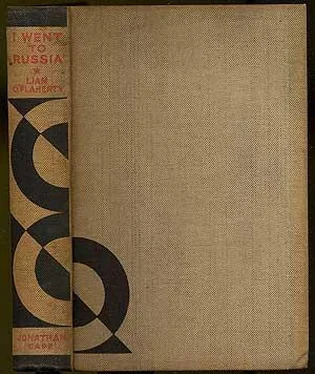Liam O'Flaherty - I Went to Russia
Здесь есть возможность читать онлайн «Liam O'Flaherty - I Went to Russia» весь текст электронной книги совершенно бесплатно (целиком полную версию без сокращений). В некоторых случаях можно слушать аудио, скачать через торрент в формате fb2 и присутствует краткое содержание. Город: London, Год выпуска: 2011, ISBN: 2011, Издательство: Bloomsbury Publishing, Жанр: Публицистика, на английском языке. Описание произведения, (предисловие) а так же отзывы посетителей доступны на портале библиотеки ЛибКат.
- Название:I Went to Russia
- Автор:
- Издательство:Bloomsbury Publishing
- Жанр:
- Год:2011
- Город:London
- ISBN:9781448205592
- Рейтинг книги:5 / 5. Голосов: 1
-
Избранное:Добавить в избранное
- Отзывы:
-
Ваша оценка:
- 100
- 1
- 2
- 3
- 4
- 5
I Went to Russia: краткое содержание, описание и аннотация
Предлагаем к чтению аннотацию, описание, краткое содержание или предисловие (зависит от того, что написал сам автор книги «I Went to Russia»). Если вы не нашли необходимую информацию о книге — напишите в комментариях, мы постараемся отыскать её.
I Went to Russia — читать онлайн бесплатно полную книгу (весь текст) целиком
Ниже представлен текст книги, разбитый по страницам. Система сохранения места последней прочитанной страницы, позволяет с удобством читать онлайн бесплатно книгу «I Went to Russia», без необходимости каждый раз заново искать на чём Вы остановились. Поставьте закладку, и сможете в любой момент перейти на страницу, на которой закончили чтение.
Интервал:
Закладка:
‘But already,’ he cried, ‘the work has begun.’
At that moment the cab jolted violently and the horse, whipped fiercely, dashed aside to avoid a huge hole in the ground.
‘See,’ cried my friend excitedly. ‘This hole was not there this morning but already during the day it has been made. Wonderful.’
We turned a corner and halted. Instead of a thoroughfare there was a great mountain of earth and stones. The driver cursed and turned back to go another way.
‘Everywhere,’ cried my friend excitedly, ‘holes are made and streets torn up in order to put down asphalt. It is wonderful. In two years Moscow shall be all asphalt. In ten years every sign of the old city shall be swept away and a new socialist city shall be built. Wonderful. Hey!’
We were thrown into one another’s arms and one wheel went into the air, as the cab escaped another hole by the skin of its teeth. Before we could recover our balance another cab dashed into ours and a furious whipping and cursing began, which lasted for three minutes, ending in the victory of our driver over his enemy, who fled in confusion.
It’s terrible,’ cried my friend. ‘Why don’t they get Ford taxis and abolish this anarchy?’
But almost immediately he became enthusiastic once more as our cab found a street that was not torn up and jolted along peacefully at the rate of a mile an hour.
I must talk to you about your books,’ he continued. I like them. They are very good, but here in Russia you must learn a new ideology. Then they shall be better. You must now begin to write for the revolution. Otherwise, literature is useless. For myself, I am such a person, what you call a bookworm, a critic. I am such a man, who reads everything, a walking bookshop. My speciality is English literature of the nineteenth century. But I also have studied English literature of the eighteenth and seventeenth centuries. But especially the nineteenth century is interesting for us in Russia, as it was in that period that England became an industrial country. Therefore, the literature of that period must bear a relation to our present needs, when we are building our industries. You see that among us everything is intelligently organised. That bloody fellow! What is he doing?’
This time the cab had got into a hole and was trying to get out again; but that was difficult as one of the wheels kept slipping along a tram track that had been exposed by the street excavations. A number of workmen engaged in digging the street looked on with amusement; but finally a couple of them helped the driver to lift the wheel on to the untorn surface. We moved on.
‘You see,’ said my friend, ‘the Five Year Plan is everywhere, in the streets as well as in the factories and fields.’
‘Don’t you find it uncomfortable?’ I said. ‘I mean, in order to carry out the Five Year Plan, you have to put up with all sorts of discomfort, in moving from one place to another, in the matter of food and cigarettes and clothes.’
‘Comrade,’ he cried, ‘the situation is such. For all good citizens of the Soviet Union, these discomforts and hardships are a pleasure. And more especially for citizens like myself. I must tell you I was not always a proletarian. My parents belonged to the bourgeoisie. Even I myself was such a dreadful type, that I opposed the revolution when the time of the great famine came. Then I realised that my position was incorrect, seeing that the whole capitalist world was in league with the whites and the social revolutionaries against the Communists. So I have since been a Bolshevik. I am not a member of the Party and therefore cannot call myself a Communist. But I hope one day, perhaps, the proletariat is going to forgive me my ancestry and my past errors and take me into the Party. To that end I work hard and try to annihilate in my nature all defects. I try all the time to annihilate my personality and to become absorbed in the mass. I try very hard to cease to be an individual and to become a unit in the broad bosom of the masses. I try to forget completely that I am such a one, Theodore Levit, and I would like just to call myself by a number and to work without recognition, work day and night, all the time, until my death, so that finally, this great crime shall be forgiven and I shall become completely a brother of the lowest and most humble proletarian, who is greater than I, even though he does nothing but stand so, with his arms folded, greater because he has not sinned like I and he is a pure proletarian.’
‘Christ!’ I thought. ‘How little it has changed in two thousand years, this religion of seeking God through self-effacement!’
‘Therefore comrade,’ he continued, almost in a state of frenzy, ‘the situation is such. To suffer is a pleasure for me. And very many Russian intellectuals are like, being of bourgeois ancestry. In our Bureau there are many such. They also struggle to annihilate their personality and to learn how to suffer with the masses. For us it is even necessary to be more eager than the masses, because we are on trial. In that way, we are watch dogs of the revolution, as somebody has said. One day, on a tramcar, I heard three workers talking about the shortage of food in a loud voice, complaining in a counter-revolutionary manner that it was difficult to get butter. At the next stop I called a militia man and these three men were brought to the militia post where I made a statement against them. In such a way we are the watch dogs of the revolution. But now we have arrived and eating shall take place.’
The House of the Press, or as we should call it, the Press Club was open to everybody connected with journalism and publishing in Moscow. Here the members could have their meals and amuse themselves at billiards and other games. It was not a very ornate place, its restaurant being rather like those foreign restaurants in Bloomsbury frequented by the younger intellectuals. But the food was excellent and the atmosphere was pleasant. Over some excellent soup, roast goose and vodka, my friend continued to enlighten me on the subject of Soviet intellectuals.
In Russia we have no use for the bohemian writer,’ he said. ‘We look upon the writer as a worker, like a carpenter or a dock labourer. Therefore he is paid by the number of words he writes and he must write a certain number of words every month in order to live. Just as the carpenter must make a fixed number of chairs or tables. It is better so.’
It is difficult to believe that,’ I said. ‘Do novelists, for instance, all write a certain number of words a month and do they get paid by the word?’
‘All get paid that way,’ he said. ‘A novel is paid for at the rate of one thousand roubles for six typographical pages. It does not matter if the writer is famous or not, all get paid alike. In England it is different.’
‘But do all writers get paid just one thousand roubles for the complete rights of their books?’
‘Oh! No,’ he said. ‘The situation is such. This money is paid on publication. Then if another edition is published another thousand roubles is paid. Each edition counts as one book. Also in Russia there is no monopoly. A writer may sell his book several times, if he can find publishers for it.’
‘But that amounts to the same thing as in England/ I said. ‘The popular writer can get rich while the unpopular writer merely gets one thousand roubles per book.’
It is so,’ he said. ‘But there are other means of preventing the popular writer from getting too rich.’
‘How?’ I said.
It is a Russian method,’ he said, but refused to disclose the method.
From other sources, I learned this method, which is an ingenious one. It was the case of a writer called Boris Pilniak which disclosed the method. Pilniak was an efficient and popular writer who prospered exceedingly. He bought himself a house and stocked it with choice furniture, which he found in the antique shops of Moscow. He took holidays abroad where he lived comfortably on his foreign royalties, as his books were also popular in central Europe. He brought from abroad choice raiment and other amenities, which his Soviet brothers were unable to procure. In a word, Comrade Pilniak began to lead a life which resembled remarkably that of a rich bourgeois writer in England, America or France. He thus aroused the jealousy of his brother writers and of the government, who were forced by law to starve on three hundred roubles a month. Becoming conceited by too much prosperity, he wrote a novel which was a trifle too daring. The government officials, seeing their chance of putting him in his proper place, refused to publish the manuscript in Russia, but allowed it to be exported to Germany, where it was received with enthusiasm by the Russian counter-revolutionary groups and published broadcast in serial form in their newspapers. These newspapers being imported into Russia were used by the government as a proof that Pilniak was a counter-revolutionary in tendency. The man was disgraced. His popularity disappeared and he is again a struggling Soviet writer.
Читать дальшеИнтервал:
Закладка:
Похожие книги на «I Went to Russia»
Представляем Вашему вниманию похожие книги на «I Went to Russia» списком для выбора. Мы отобрали схожую по названию и смыслу литературу в надежде предоставить читателям больше вариантов отыскать новые, интересные, ещё непрочитанные произведения.
Обсуждение, отзывы о книге «I Went to Russia» и просто собственные мнения читателей. Оставьте ваши комментарии, напишите, что Вы думаете о произведении, его смысле или главных героях. Укажите что конкретно понравилось, а что нет, и почему Вы так считаете.












